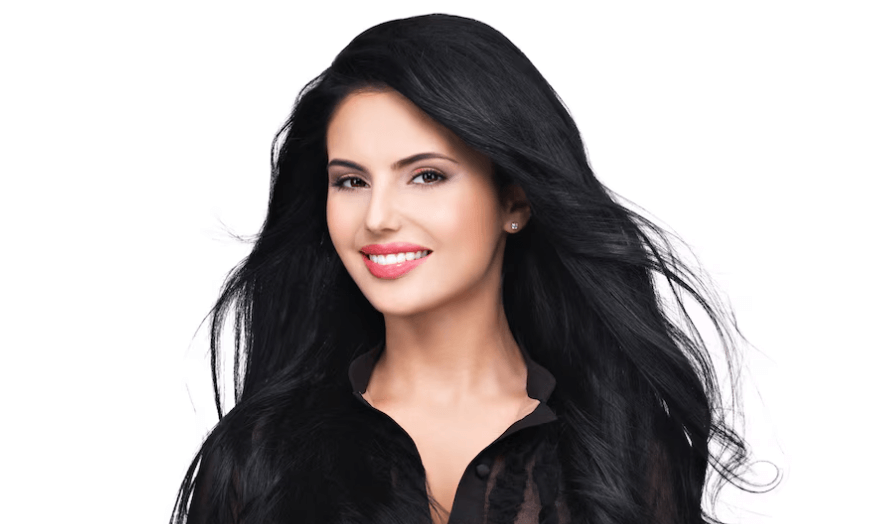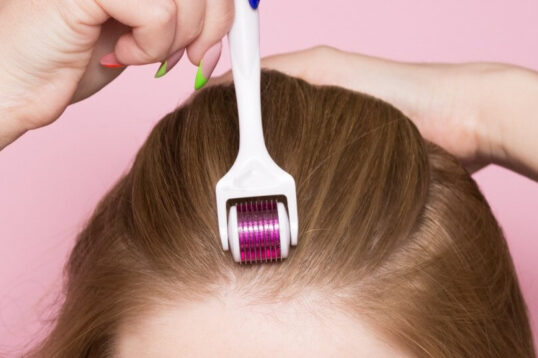Are you struggling to achieve long, luscious strands? You’re not alone, especially in the Black community. Finding the right products for your hair type can be a challenge. We’ll explore the “best” oils specifically for promoting hair growth on Black hair, considering unique needs and textures.
Learn how to use the best oil for black hair growth to achieve lush, vibrant hair. This oil is formulated with naturally occurring components recognized for their nourishing qualities.
- Black hair is unique and needs special care to grow healthy and strong.
- Oils can help moisturize, nourish, and protect black hair from damage and breakage.
- Castor oil, coconut oil, jojoba oil, olive oil, and peppermint oil are some of the best oils for black hair growth.
- A balanced diet, drinking enough water, and avoiding harsh chemicals or heat styling can help stimulate hair development.
- Oils can stimulate hair development by being massaged into the scalp, applied to the ends of the hair, or combined with Hibiscus shampoo or conditioner.
You can also use Cantu Biotin-Infused Hair Oil for hair growth. Let’s unlock the secrets to achieving your hair goals and embrace your natural beauty!
Why Black Hair Needs Special Care
Black hair is beautiful and versatile, but its unique characteristics make it different from other hair types. Black hair is typically:
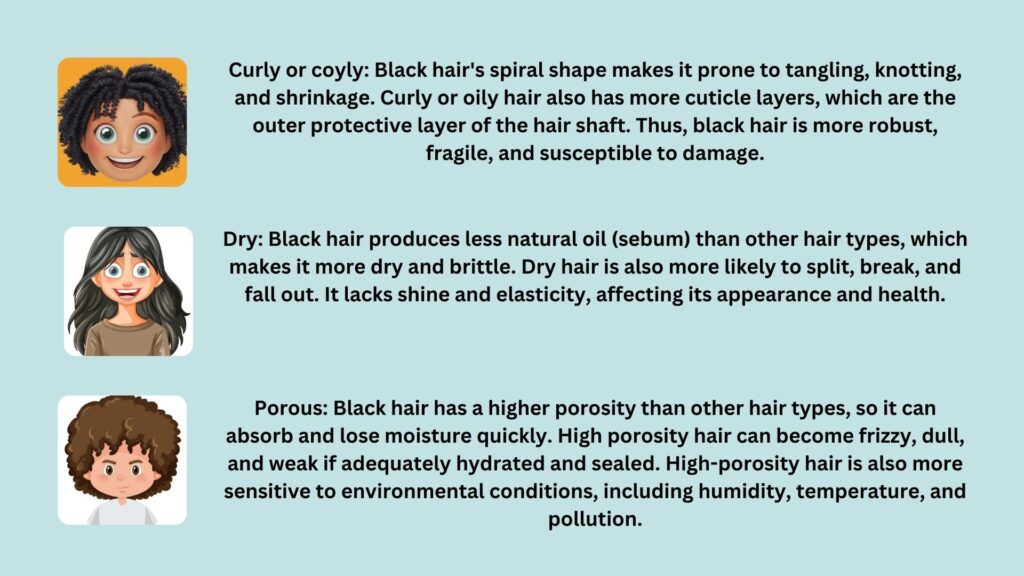
Because of these characteristics, black hair needs special care to grow healthy and strong. One of the best ways to care for black hair is to use oils.
How Can Help Oil for Black Hair Grow
Oils are natural substances that moisturize, nourish, and protect black hair from damage and breakage. Oils can help black hair grow by:
Though it is an excellent oil, its spanking could be nasty for your hair if you use too much of it. Use little and work up a spank according to your texture and requirement.
Many Oils Benefits: Oil For Black Hair Growth
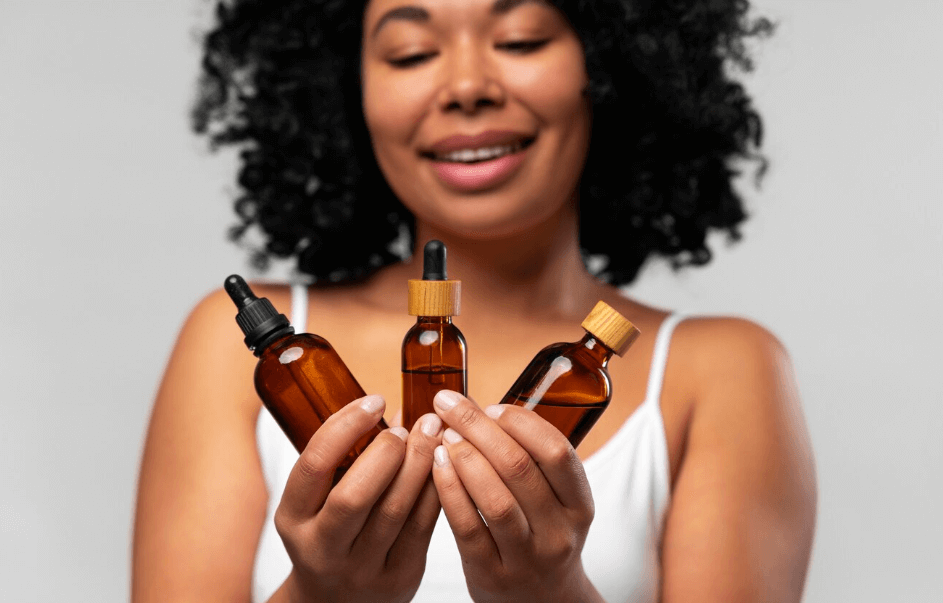
Many types of oils can benefit black hair, but some of the best oils for hair growth black hair are:
- Castor oil: castor oil is a thick, viscous oil made from the seeds of the castor plant. Ricinoleic acid, one of the omega-9 fatty acids in castor oil, improves blood flow to the scalp and promotes hair growth. Castor oil for black hair can moisturize, thicken, and strengthen black hair, preventing dandruff and scalp infections. You can try the famous Jamaican Black Castor Oil, which helps improve overall health and hair growth. It works wonders on the edges of thin and brittle hairlines, growing thicker and healthier hair in these fragile areas.
- Coconut oil: Coconut oil is a light, sweet oil made from the flesh of coconuts. It is one of the few oils that may enter the hair shaft and deliver deep moisture to the cortex. Coconut oil for black hair can nourish, protect, and repair black hair, prevent protein loss, and reduce breakage. It is also antibacterial, antifungal, and anti-inflammatory, which can keep the scalp healthy and free of problems.
- Jojoba oil: Jojoba oil for black hair is a golden liquid wax extracted from the seeds of the jojoba plant. It is ideal for maintaining a correct balance between pH level and scalp oil production since it is similar to the scalp’s natural oil (sebum). Jojoba oil for black hair may hydrate, condition, and soften black hair while adding shine and smoothness. It is non-comedogenic since it doesn’t clog pores or induce acne.
- Olive oil: The fruit of the olive tree is used to produce extra virgin olive oil, an outstanding green oil. Olive oil contains oleic acid, an omega-9 fatty acid that protects and nourishes oil for black hair from dryness and damage. It can also smooth, soften, and add shine to black hair and prevent frizz and split ends. Olive oil is also anti-inflammatory, soothing and healing the scalp from irritation and inflammation.
- Peppermint oil: Peppermint oil is a clear, minty oil extracted from the plant’s leaves. It is stimulating and helps enhance blood flow to the scalp, promoting hair growth. Peppermint oil for black hair can also cleanse, refresh, and invigorate black hair and combat dandruff and scalp infections. It also cools, relieving itching and burning sensations on the scalp.
Popular Oil Options: Popular oil for black hair, including carrier oils (coconut oil, jojoba oil, argan oil) and essential oils (rosemary oil, peppermint oil, tea tree oil).
How to Use Oil for Black Hair Growth
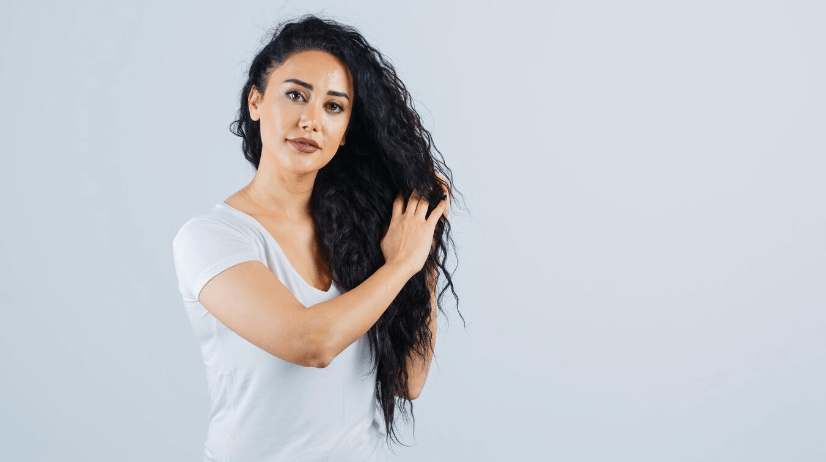
There are different ways to use oil for black hair growth, depending on your preference and hair condition. Here are some of the most common methods:
Scalmassagegt uses your fingertips to apply mild pressure and circular strokes to the scalp. It can improve blood circulation, relax the scalp muscles, and stimulate hair growth. To use oils for scalp massage, you can warm a small amount of oil (about a tablespoon) in a microwave or a double boiler and then apply it to your scalp.
Depending on your needs, you can use one or a combination of oils. For added advantages, mix with a few drops of essential oils, such as peppermint. Use a mild shampoo to remove any leftover oil after rubbing your scalp for ten to fifteen minutes. This can be done as frequently as you’d like, once or twice weekly.
Hair ends treatment is a technique that involves applying oil to the ends of your hair, which are the oldest and most damaged parts of your hair. Hair end treatment can moisturize, seal, and protect hair ends from splitting and breaking. To use oils for hair end treatment, apply a few drops of oil (about a teaspoon) to your hair ends, either on damp or dry hair.
You can use one oil or a mixture of oils, depending on your needs. Add a few drops of essential oils like lavender oil for additional advantages. Leave the oil on your hair ends for as long as you want or overnight, then wash your hair as usual. You can do this whenever you wash your hair or as often as you like.
Shampoo or conditioner additive is a technique that involves adding oil to your shampoo or conditioner, which can enhance their moisturizing and nourishing effects. Shampoo or conditioner additives can help your hair retain more moisture and prevent dryness and damage. To use oils for shampoo or conditioner additive, add a few drops of oil (about a teaspoon) to your shampoo or conditioner, either in the bottle or in your palm.
You can use one oil or a mixture of oils, depending on your needs. For additional advantages, add a few drops of essential oils like rosemary. Use your shampoo or conditioner as usual, and rinse your hair thoroughly. You can do this whenever you wash your hair or as often as you like.
After applying a leave-in conditioner, use a small amount of oil to “seal” the moisture in your hair strands, preventing dryness and frizz.
Other Tips Oil for Black Hair Growth
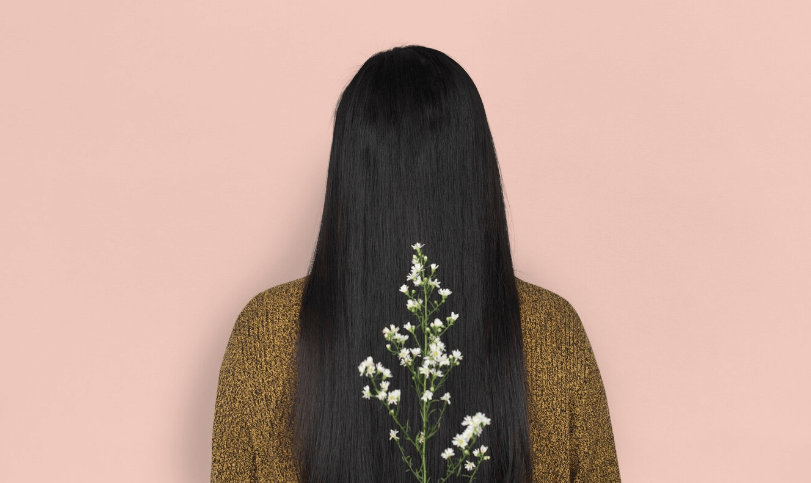
Using oil for black hair growth is a great way to care for your black hair, but it is not the only thing you can do. Here are some other tips for hair growth black hair:
Limit the use of heat-styling tools like straighteners or curling irons, which can damage hair and hinder growth. Explore heat-free styling techniques whenever possible.
If dietary needs aren’t fully met, consider consulting a doctor or nutritionist about hair-supporting supplements like biotin or vitamin D.
Conclusion
Black hair is unique and needs special care to grow healthy and strong. Oil for black hair can help moisturize, nourish, and protect black hair from damage and breakage and promote hair growth. Some of the best oils for hair growth black hair are castor oil, coconut oil, jojoba oil, olive oil, and peppermint oil. You can use oil for black hair growth by massaging it into your scalp, applying it to your hair ends, or mixing it with your shampoo or conditioner. To promote hair development, you should eat a balanced diet, drink enough water, and avoid using harsh chemicals or heat styling. By following these guidelines, you can develop gorgeous and long black hair.
FAQs about oil for black hair
What are the best oils for black hair?
Some of the best oils for black hair include coconut oil, jojoba oil, argan oil, castor oil, and olive oil. These oils help moisturize the hair, promote growth, and improve overall health.
How often should I oil my black hair?
The frequency of oiling black hair depends on your hair type and condition. Generally, oiling your hair 1-2 times a week is sufficient for most people. However, if your hair is dehydrated, you may need to oil it more frequently.
Should I oil my hair only or my scalp as well?
You should always apply oil to your hair and scalp. Massaging oil into your scalp encourages healthy hair development by nourishing and moisturizing the hair follicles. If you have an oily scalp, avoid setting oil directly on it and concentrate on the ends of your hair instead.
Is it okay to let the oil sit in my hair all night?
It is possible to leave oil for black in your hair all night. This enables the oil to moisturize and maintain your hair by stabbing deeper into the shaft. Nevertheless, you can wipe the oil off after a few hours if you would rather not keep it on overnight.
How do I remove oil from my hair?
You can use a gentle shampoo and warm water to remove oil from your hair. Make sure to lather the shampoo well and rinse thoroughly to remove all traces of oil.
Can I mix different oils for my hair?
Several oils can be combined to create a nutritious hair treatment. You can tailor your hair care regimen by blending different oils to meet your demands. Castor and coconut oils can be used to achieve this.
Are there any oils I should avoid for black hair?
Certain oils, such as those made of minerals and petroleum, can clog your scalp’s pores and prevent moisture from reaching your hair shaft. It is advisable to avoid these oils and use natural oils that your hair can more readily absorb.
How can I use oil to promote hair growth?
Massage oil into your scalp to encourage development and boost blood flow to the hair follicles. In addition to stimulating healthy hair growth, this can help nourish the hair follicles. Vitamin and nutrient-rich oils can also help strengthen your hair and lessen breakage, enabling longer, healthier hair.
